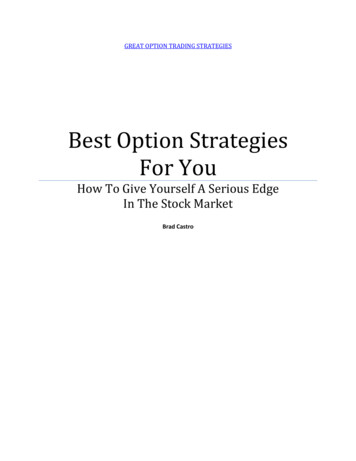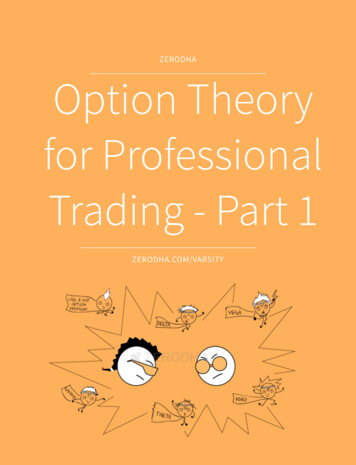
Transcription
GREAT OPTION TRADING STRATEGIESBest Option StrategiesFor YouHow To Give Yourself A Serious EdgeIn The Stock MarketBrad Castro
Best Option Strategies For YouI hope I’m not being too presumptuous (or bossy) by telling you what I think the best optionstrategies are for you.Consider what follows then more in the vein of “Making The Case For Certain Strategies” vs. metrying to be a know-it-all and run your life.And I’m also making certain assumptions here which may or may not be true –The information I’m sharing is based upon many years of personal option trading experience aswell as the assumption that you are new to options, or relatively new, or even that you do havesome experience with options, but that you’re either not satisfied with some aspect of yourresults, or that you simply believe that there has to be a better way to consistently make goodreturns in the stock market.Not All Trading Strategies Are Created EqualIf all your option trades worked out as anticipated (or hoped), there would be no need to makedistinctions.That’s probably the obvious statement of the year, but I point it out for a reason.Option trading success, in my opinion, is not so much a case of consistently being “right” ondirection and timing as much as it is in choosing strategies that have inherent structuraladvantages in the first place.Maybe that’s because I’m “wrong” so much of the time. When I set up an option trade on astock, if I’m being completely honest, I have no idea what the stock is going to do in the daysand weeks that follow.I may have an opinion, of course. I may decipher (or believe I’ve deciphered) what I consider alikely scenario to be based on my reading of a stock’s chart, but the reality is that I’d mostly beguessing if I claimed to have any special (or accurate) insight into the near term behavior of astock.And there’s a very important reason why that’s so – because there really is no “behavior” of astock. A stock isn’t alive, it doesn’t possess self-awareness, and it certainly isn’t making anychoices.Best Option Strategies For You – 2012 www.great-option-trading-strategies.comPage 1
The stock’s “behavior?” Well that isn’t determined by the stock, or even by the operations ofthe underlying business. The stock’s “behavior” is determined by the actions of its buyers andsellers.I say this a lot, but when you attempt to predict the near term behavior of a stock, whatyou’re really attempting to predict is the near term behavior of other traders.Structurally Survivable TradesBenjamin Graham, the Father of Value Investing, and famous mentor to Warren Buffett, wrotein his seminal classic, The Intelligent Investor, that the objective of investing was not themanagement of returns, but rather the management of risk.And when it comes to option trading, one of the most important risk management principlesthat I advocate is the concept of only entering what I term “Structurally Survivable” trades.When I speak of “structurally survivable,” I’m not talking about your own personal survival (nooffense, of course, and I certainly wish you a long and prosperous life). After all, if you take aloss on a trade, I trust that’s not going to ruin you or have you rushing to the window ledge ofthe nearest tall building.What I’m really talking about then is your capital, specifically your investing funds. That’s whatwe want to preserve, to make sure that we set up trades with certain structural advantagesthat give us a reasonable chance to avoid a permanent loss should the trade go against us.Now I go into this critical concept in much greater detail in a premium report entitled,“Leveraged Investing Risk Management Strategies,” (included in The Essential LeveragedInvesting Guide Package), but I’ll share the abbreviated version with you in the following pages.(Obligatory disclaimer: As you may imagine, there are numerous factors involved, and nothingis ever 100% guaranteed – for more info and details, check out the Leveraged Investingmaterial.)Selling Time vs. Being RightWhen it comes to buying and selling options, I really like being on the selling side of things.Best Option Strategies For You – 2012 www.great-option-trading-strategies.comPage 2
I really, really, really like it.Now I’m not going to give you some B.S. spiel about how writing options or selling them (eitherterm is correct) is some kind of magic bullet or that it’s like being the casino while all those onthe buying side of your trades are a bunch of speculative gamblers and lottery ticket buyers.If long option strategies NEVER worked, no one would use them. But if you’re right about astock’s price action, and you’re right on the timing, then a long option strategy can make you alot of money in a very short amount of time.But the key is you HAVE to be right.If, however, you’re wrong about either the price action or the timing of your call, that’s whenthe trouble starts.Now there may be things you could have done to minimize your risk initially, and there may beadjustments you can make to limit the damage once the trade begins to move the wrong way,but the reality is that when you’re wrong, it’s going to be next to impossible to avoid incurringsome kind of loss.When you’re on the long side of the trade, you don’t get a second chance.In contrast, when you’re on the short side of the trade (i.e. selling or writing options) and thetrade moves against you, you frequently CAN get a second chance. And a third. And a fourth ifnecessary. Or as many as you need, in fact.[note: that’s not true for all selling side/credit spread type trades, of course – which we’lladdress a little later.]Only The Gods Transcend TimeFortunately for us, we don’t need to transcend time in order to sell it.Because – and this is a critical point to understand. When we write or sell options, what we’rereally selling is time itself.And the nice thing about time is that there will always be more of it (unfortunately, that doesn’tmean that you or I will always be around to enjoy it).Recall the fundamental nature of options as a wasting asset. The value of an options contractconsists of intrinsic value (the relationship between the current share price of the stock and theBest Option Strategies For You – 2012 www.great-option-trading-strategies.comPage 3
option’s strike price) as well as its extrinsic or time value (basically everything that isn’t intrinsicvalue).At expiration, however, the only value that will remain is intrinsic value. And if there is nointrinsic value, then the option expires completely worthless. In either case, an option willNEVER possess any time value at expiration, since time for that contract has run out.Ah, the fleeting nature of life itself. Like the rest of the past, it’s gone, relegated to the shadowsand the flickering memory of history.So what could be better than getting compensated for being on the inevitable side of thepassage of time?Well, it gets even better.Because even when you’re wrong as a seller of options (and this is true whether you’re sellingcovered calls or selling puts), you can always sell more time (it may be fleeting, but as long asyou’re still kicking, time is always there just free for the taking).OK – so how about some pragmatic applications and illustrations of my philosophicalnonsense?Structurally Survivable Cash-Secured PutsWriting cash-secured puts on high quality companies at attractive prices is one of my favoriteoption trading strategies.Basically, when you write a cash-secured put you’re offering to buy 100 shares of theunderlying stock at a certain price (the strike price). And you’re also getting compensated fordoing so (in the form of a premium cash payment).This strategy is frequently likened to being an insurance company in that you’re “insuring”someone else’s shares (if the stock drops below a certain level at or prior to expiration, theholder of the put knows he or she can always unload the shares on you at the agreed uponprice).And one other point – the cash-secured aspect is significant. What that means is that you haveenough cash in your brokerage account to fully cover the purchase of the shares should youever be assigned (i.e. when the holder of the put exercises the put).Best Option Strategies For You – 2012 www.great-option-trading-strategies.comPage 4
Now, there are a lot of different tricks to getting these trades right, which I spell out in greatdetail in The Essential Leveraged Investing Guide, but when you do get them right, they canproduce some pretty terrific yields and they can also help you acquire those high quality sharesat some amazing prices.But there’s another reason why I also really like them – even if the trade goes against me, I canusually find a way to eventually wiggle free and not only NOT lose money, but actually continueto book income again and again throughout the entire series of trades and adjustments thatensue.When a cash-secured put goes against me so that the shares are trading below the strike priceas expiration nears, and especially so if it would now cost me more to buy back the put than Ireceived when I first sold it, to the untrained eye, that would appear to be a loss.(And, most likely, to your tax accountant as well.)But when we talk about option contracts, we’re not talking about super complex contracts thatwere negotiated by teams of high-powered lawyers over several arduous months. Optioncontracts are actually amazingly flexible and easy to work with.And to exchange.I wouldn’t exactly call it renegotiating, but when you’re on the selling side of these things, youcan always “roll” them (buying back the put that’s expiring and selling a new put expiring at alater date).Without going into all the minutiae and the mechanics here, when I roll in the money shortputs, I have one of two objectives – to generate additional premium in the form of a net credit(selling the new put for more than it cost to close out the old one) or else to lower the strikeprice on the new put.In either case, I’m lowering my eventual cost basis should I ever get assigned (or allow myself tobe assigned). And at some point, assuming the share price does rise again (remember, we’rehopefully talking about a high quality business here), or if I’ve sufficiently lowered the strikeprice on my subsequent rolls, the put(s) will most likely close out of the money and expireworthless.And that would also leave me with a lot of accumulated premium and some interesting storiesto tell the kids and grandkids about how a trade went against me but due to the structuraladvantages that existed in the first place, I not only came out unscathed, I also most likelygenerated some decent returns in the process.Best Option Strategies For You – 2012 www.great-option-trading-strategies.comPage 5
ConclusionI hope you’ve found this to be useful. It’s not designed to be a comprehensive covered call orput writing tutorial, but rather a quick intro to the way I personally trade and invest.And it was fun for me to put together, too. Who doesn’t enjoy sharing the things he’s learnedfrom years and years of doing something you love.And I especially love sharing it with individuals who are receptive to the idea that they canactually improve their lives and their finances (believe me, I get my share of glassy eyed staresand yawns from family members and friends who don’t have this belief).I’m not putting anyone down, but there are just so many people out there who buy in to thatnonsense that the individual has no business investing on his or her own. The idea that youneed to pay “experts” (with abysmal track records, by the way) to invest for you, or else buy abig index or ETF so that you not only own tiny little pieces of world class businesses, but youalso own even more tiny little pieces of mediocre and struggling businesses – this is absurd.Hmmm . . . I wonder if the managed money industry’s millions of dollars in advertising eachyear is effective in getting their message out?Know why the “average” person can’t beat the markets? Because the “average” person spendsabout 3 seconds a month actively thinking about investing. And you know why most mutualfunds fail to even match the market’s returns each year? Aside from the fees they charge you,the biggest reason is that those fund managers have WAY too much money to competentlymanage in the first place.Investing well is like any other skill – it’s learnable and it’s really not that hard. You just needsome good educational resources and a willingness to take action (where the real learningtakes place). And today, terrific resources to learn and develop ANY skill are in abundance.I sincerely wish you the best investing success that’s possible, and that you find the resourcesthat meet your needs and fit your personality.And if any of what I’ve written here resonates, and you want to learn more about how I useoptions to manage and enhance my own investments, you can check out what I do here.Take care,BradContact FormBest Option Strategies For You – 2012 www.great-option-trading-strategies.comPage 6
Best Option Strategies For You - 2012 www.great-option-trading-strategies.com Page 1 Best Option Strategies For You I hope I'm not being too presumptuous (or bossy) by telling you what I think the best option strategies are for you. onsider what follows then more in the vein of "Making The ase For ertain Strategies" vs . me










